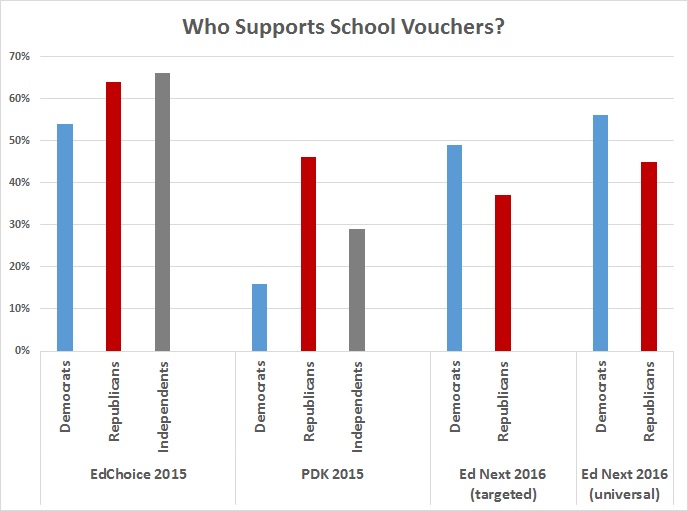
This week, PDK International released its annual survey of public opinion on schools. Its results shed little light on this question, since it now delves much more deeply into big-picture questions about the purpose of American schooling, but avoids questions about charter schools, vouchers, or parental choice in education. As a result, we have to dig in to other recent polls.
Last year, EdChoice, nee the Friedman Foundation, found stronger support for vouchers than Ed Next. It also found support for vouchers was stronger among Republicans (64 percent) than among Democrats (54 percent). Among independents, it was strongest of all (66 percent). That survey asked the question this way:
A school voucher system allows parents the option of sending their child to the school of their choice, whether that school is public or private, including both religious and non-religious schools. If this policy were adopted, tax dollars currently allocated to a school district would be allocated to parents in the form of a “school voucher” to pay partial or full tuition for their child’s school. In general, do you favor or oppose a school voucher system?
PDK’s survey last year found general opposition to private school vouchers, but much stronger opposition among Democrats (16 percent support) than Republicans (46 percent). Independents were in the middle (29 percent) It asked the question this way:
Do you favor or oppose allowing students and parents to choose a private school to attend at public expense?
Meanwhile, the American Federation for Children, a pro-school choice group, has found in its surveys that the general public supports the idea of “school choice.” Support is especially strong among Republicans (80 percent), but the survey finds Democrats support it too (65 percent).
One thing is consistent throughout all these polls: The way people are asked about vouchers or school choice matters a lot. In an effort to be even-handed, Ed Next asks its questions on both means-tested and universal vouchers two ways. One question emphasizes “wider choice” for parents (accentuating the positive case for vouchers), while the other emphasizes government spending (accentuating the negative).
These polls suggest the wording of questions can also affect which groups say they support vouchers more.


